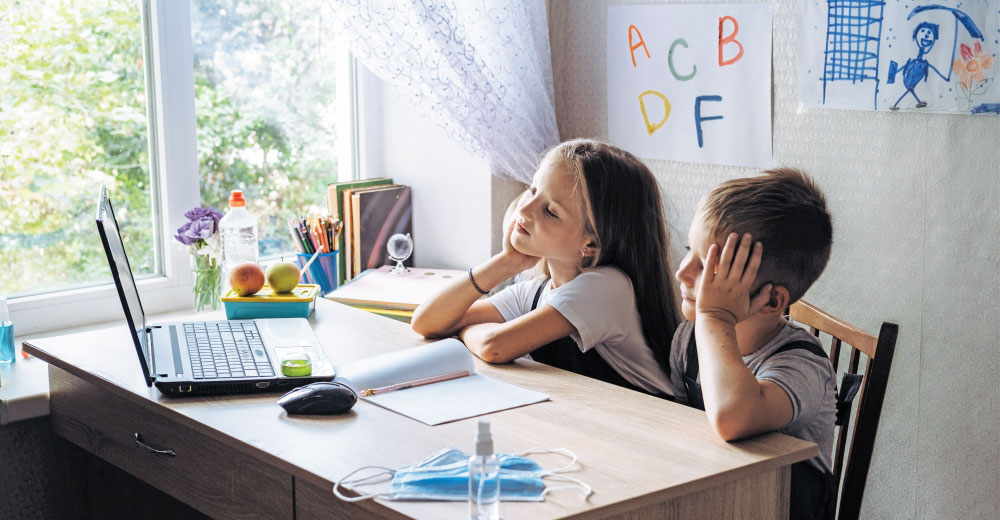During MCO 3.0, children are always at home since they are not going to school and they are not able to meet up with their friends. There are a few things that parents and family members can help to make the lockdown period more bearable but safe for children.
Keeping a routine
Making a schedule daily is helpful for children especially when they have to be at home the whole day. It doesn’t have to be strict but at least the schedule makes sure the children wake up and go to bed about the same time everyday. In the schedule, there should be allocated time for exercise, playtime, studies and other family activities or games. Maintaining a schedule can be calming as the children know what will happen and when it will happen. There should also be a time limit for the usage of smart gadgets such as smartphones and tablets to avoid addiction.
Maintain physical activity
Children are not able to go to the park or playground for exercise during the lockdown period. Thus, it is crucial that parents make sure they incorporate some exercise in their children’s daily routine. Parents need to set an example by being physically active themselves. It’s even better to exercise as a family’s regular routine. Examples of exercises could be aerobic exercises, dancing to their favourite songs, walking and cycling around the housing area.
Incorporate new activities
We can make use of the lockdown period to spend more quality time with children. Try to think of more family activities that can improve bonding such as treasure hunting, drawing, baking, puzzle time, board games or even music activities. Having more of such activities can also help to reduce internet-based activities such as gaming and usage of social media.
Stay socially connected
Socializing with friends and family is one of the best ways to regulate our mood and this applies to children as well. Unfortunately, the lockdown period has practically prevented such socialisation activities from happening. Fortunately, with technology, it helped to bring friends and families closer although they are unable to meet. Allow children to have video calls with family members such as grandparents, uncle, aunty, cousins and even friends and schoolmates. This way, children feel less lonely and it also helps to reduce anxiety and stress.
Filtering news from TV or the internet
There is a constant flow of news regarding the Covid 19 situation from the television and also from the internet. Children might misinterpret the news and this causes an increase in fear and anxiety. Parents should talk to the children often and explain the facts of the current situation and answer whatever questions that they might have appropriate to their age. For example, for younger children, parents don’t need to go into the details of the disease whereas for an adolescent, parents can be a bit more open.
Improve ventilation at home
Bringing fresh air into the house prevents virus particles from accumulating inside the house. Opening doors and windows can improve the ventilation in the house. If it’s unsafe to do so you can use air filters or switch on the exhaust fans. It is recommended to change the air filter every 3 months or according to the manufacturer’s recommendation.
Clean regularly
Cleaning the house with a household cleaner or detergent can help to reduce germs on surfaces. Cleaning alone is adequate to remove most of the virus particles from the surface. We need to focus more on places or things where there is a high frequency of touching such as door knobs, switches, remote controls, toys etc.
Continue healthcare follow up and routine vaccinations
It is strongly recommended that children continue to follow their routine healthcare follow up and vaccination schedule during the pandemic. During the follow-up, the doctors and parents can assess the growth and development of their children and can discuss any health issues that are worrying. Vaccination is important to prevent vaccine preventable diseases such as measles and whooping cough. They are contagious and can be severe in babies and younger children.
Emotional changes in children
With the outbreak of Covid 19 affecting globally, many countries including Malaysia have implemented lockdown. Lockdown causes a sudden interruption to people’s normal daily life, relationship, behaviour, habits and working environment. Children are not excluded from such changes as school closes and children are forced to stay at home. The constant flow of news on social media and news of their loved ones being quarantined or afflicted with the virus and subsequent death causes a lot of fear and anxiety in children. It is crucial that parents and caregivers look out for potential behavioural changes that could indicate psychological stress in children. Not all children respond to stress in the same way but common changes to look out for would be:
- Irritability
- Excessive crying
- Clinging behaviour as they have fear of losing loved ones
- Unhealthy eating habits or reduced/increased appetite
- Disturbance in sleep pattern
- Prolonged episodes of anger
- Frequent lashing out at others
- Excessive worry
- Unusual and persistent sadness
- Showing disinterest in activities that were enjoyed in the past
- Feeling of hopelessness
- Withdrawal from family and friends
What can be done?
Parents and caregivers need to routinely ask the children how they are feeling. If they are feeling sad or worried, find out the reason for these feelings. It is also important to let them know that it is understandable for them to feel that way. Let children open up their feelings. Parents can help to divert their attention to healthy activities at home. Help them focus on things that they can control. Tell them how to keep themselves healthy by following precautions such as wearing masks, washing hands and maintaining a physical distance. Help children discover new hobbies such as painting, baking, crafting or reading. Keeping a routine for sleeping, waking up, playing, studying and exercising is also very important. It keeps children calm as they know what they can expect for the day rather than living in uncertainty.

Consultant Paediatrician & Neonatologist,
Pantai Hospital Ayer Keroh



